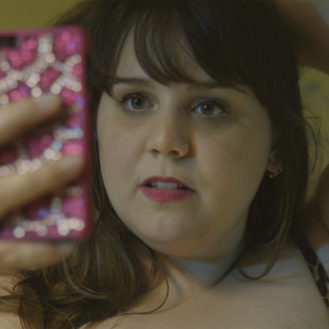Sex work is just another shitty job in Bliss, a tender and moving exploration of queer love and intimacy written and directed by German filmmaker Henrika Kull (Intimate Distance, Jibril).
Sascha (Katharina Behrens) is a middle-aged sex worker at a Berlin brothel who spends most of her life on the train between the city and the small German town where she grew up, and where her young son still lives with his father. Caught between two worlds, and her own desire to survive, Sascha finds herself drawn to the “new girl” at work, a young Italian immigrant named Maria.
Played by real-life sex worker, model, and writer Adam Hoya (the subject of the 2019 documentary Searching Eva), Maria is both Sascha’s foil and her perfect match. Though they share a profession, Sascha is older, more cynical, and more conventionally feminine than the fresh, youthful, tattooed Maria.
“I’m a performer” Maria explains, when asked what brought her to Germany. More than euphemism or deflection, her word choice is striking in its accuracy. At the centre of the film is the conflict between “real” intimacy and the facsimile of lust and passion that the women perform at the brothel. What they find with one another transcends this performance — but cannot entirely escape it, either.
The two are instantly drawn to one another, but their blossoming happiness is threatened by social prejudice, sexism, and the commodification of femininity that haunts them at work and at home. Though Sascha presents a hard exterior, she struggles with the way her job is viewed by society. As she and Maria grow closer, she becomes terrified by her own vulnerability. It’s a situation ripe for drama. Luckily, Bliss takes a subdued and quiet approach to this tension, allowing Behrens and Hoya’s performances, and the so-gorgeous-it-hurts cinematography, to do the heavy lifting.
The dialogue is sparse. Maria and Sascha’s relationship plays out more through their bodies than through conversation. There’s sex, of course, but also the intimacy of human touch as comfort and connection. The film is a visual feast of faces, hands, hair, and skin. This exploration of physicality is both visual, and auditory. The film opens on Maria standing outside Sascha’s apartment, calling her name in a voice cracking with desperation. The sound of breath is a recurring auditory symbol as well, one that suggests passion and desire, as well as the fragility of life.
Kull’s approach is sensual and immersive. Unsurprising, given that she has cited Lars von Trier and Céline Sciamma as influences. Even in the most passionate scenes, there remains a hyperawareness of the complexities of capitalism, voyeurism, and the commodification of female bodies.
Kull’s research included spending time in a real Berlin brothel; the community that the sex workers in the film create feels authentic, making the connection that Maria and Sascha form all the more believable. While Bliss doesn’t glamorize sex work, it doesn’t vilify it either. The women working in the brothel are warm, caring, and supportive toward one another. Even the madam (Petra Kauner) is a kind and maternal figure who is more of an office manager than the busty, bawdy stereotypical female brothel owner. In many ways, it’s just another job – albeit a stigmatized one.
Bliss left me feeling raw, and hopeful. It’s a surprisingly optimistic film; one that finds beauty and love in unexpected places.
**********
Do You Tweet? Follow These Tweeple:
Shannon Page: @ShannonEvePage





Be the first to comment